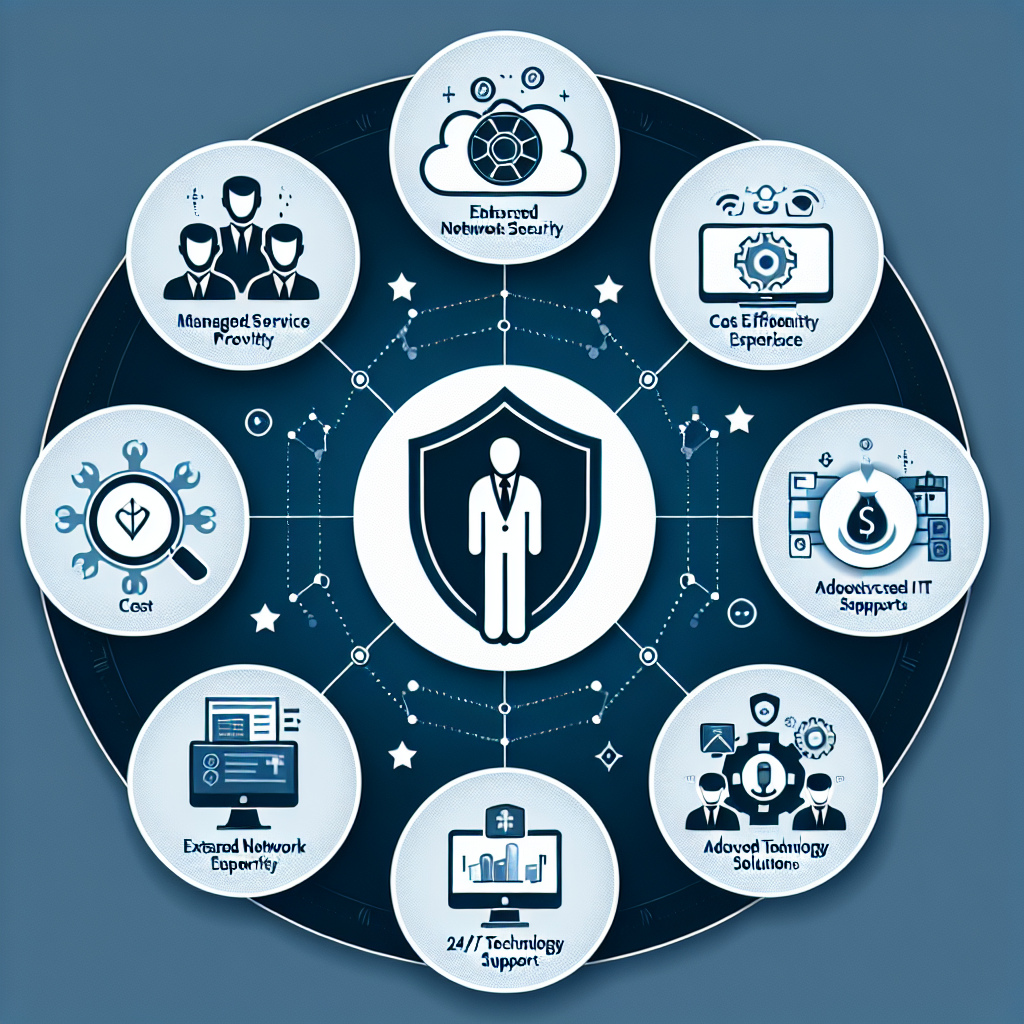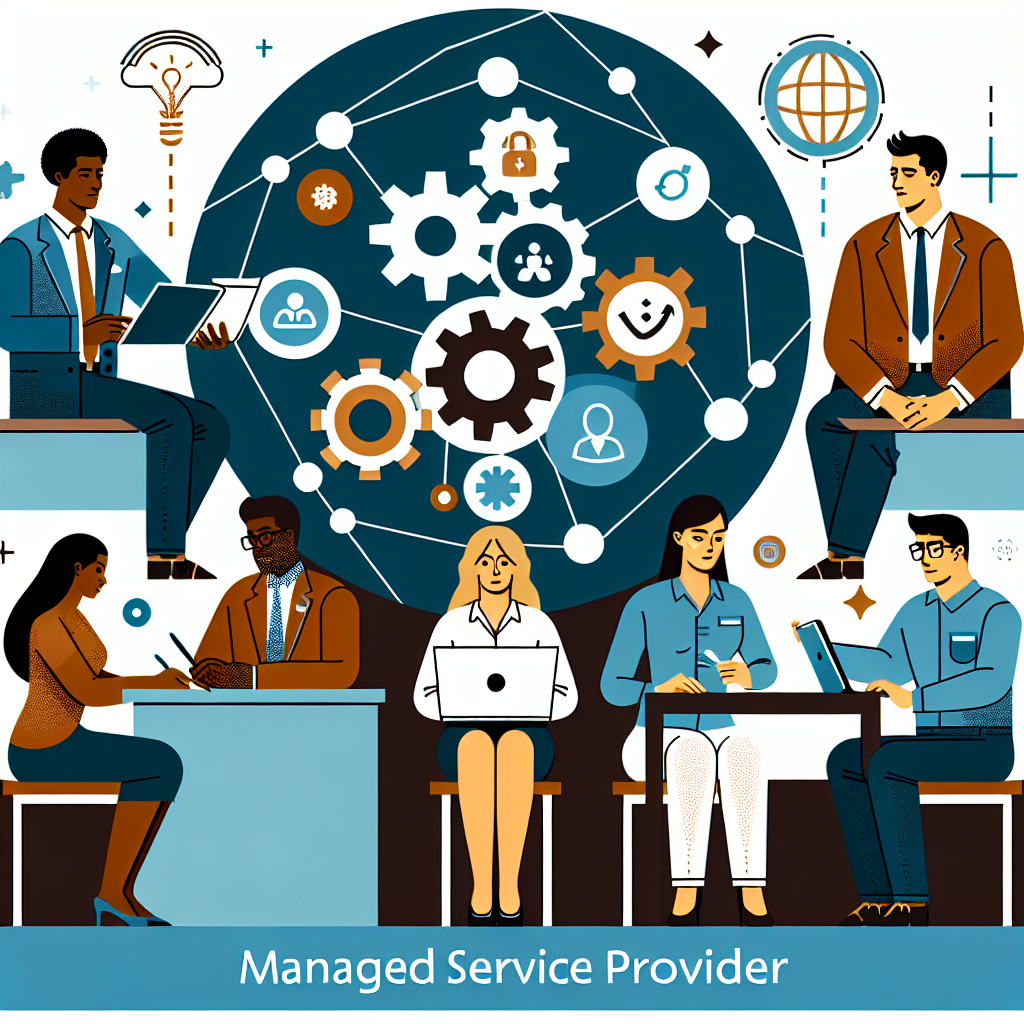Your cart is currently empty!
Tag: Provider

The Top 5 Benefits of Using a Managed Service Provider for Your Business
In today’s fast-paced business environment, it is more important than ever for companies to stay ahead of the competition and maximize their efficiency. One way to achieve this is by utilizing the services of a managed service provider (MSP). An MSP is a third-party company that manages the IT infrastructure and services of a business, allowing the company to focus on its core operations.Here are the top 5 benefits of using a managed service provider for your business:
1. Cost savings: One of the biggest advantages of using an MSP is the potential for cost savings. By outsourcing IT services to a managed service provider, companies can eliminate the need to hire and train in-house IT staff, saving on payroll and benefits costs. Additionally, MSPs typically offer fixed monthly pricing plans, allowing businesses to budget their IT expenses more effectively.
2. Increased efficiency: Managed service providers are experts in managing IT infrastructure and services, which means they can quickly resolve any issues that arise and keep systems running smoothly. This can help minimize downtime and ensure that employees can focus on their work without being interrupted by technical problems.
3. Access to the latest technology: Keeping up with the latest technology can be a challenge for businesses, especially smaller companies with limited resources. Managed service providers have access to the latest tools and technologies, allowing them to provide cutting-edge solutions to their clients. This can help businesses stay competitive and adapt to changing market conditions.
4. Enhanced security: Cybersecurity is a major concern for businesses of all sizes, as data breaches can have devastating consequences. Managed service providers have the expertise and resources to implement robust security measures and protect sensitive company data from cyber threats. This can give businesses peace of mind knowing that their IT systems are secure and protected.
5. Scalability: As businesses grow and evolve, their IT needs may change. Managed service providers offer scalable solutions that can easily adapt to the changing needs of a business. Whether a company needs to add new users, upgrade software, or expand its infrastructure, an MSP can provide the necessary support and resources to accommodate these changes.
In conclusion, utilizing a managed service provider can offer numerous benefits for businesses, including cost savings, increased efficiency, access to the latest technology, enhanced security, and scalability. By outsourcing IT services to an MSP, companies can focus on their core operations and drive growth and success in today’s competitive business landscape.

Why Small Businesses Should Consider Partnering with a Managed Service Provider
Small businesses often face numerous challenges when it comes to managing their IT infrastructure. Limited resources, lack of expertise, and the need to focus on core business activities can make it difficult for small businesses to effectively manage their technology needs. This is where partnering with a managed service provider (MSP) can be extremely beneficial.An MSP is a third-party company that manages a business’s IT infrastructure and services on a proactive basis, rather than waiting for something to break. By partnering with an MSP, small businesses can access a wide range of IT services and expertise without the need to hire and train in-house IT staff.
One of the key reasons why small businesses should consider partnering with an MSP is cost savings. By outsourcing their IT needs to an MSP, small businesses can reduce costs associated with hiring and training IT staff, purchasing and maintaining hardware and software, and dealing with unexpected IT issues. MSPs typically offer a range of pricing options, including flat-rate monthly fees, which can help small businesses better budget for their IT expenses.
Additionally, partnering with an MSP can help small businesses improve their overall IT security. MSPs have the expertise and resources to implement and maintain robust security measures, such as firewalls, antivirus software, and data encryption, to protect a business’s sensitive information from cyber threats. This is especially important for small businesses, as they are often targeted by cybercriminals due to their perceived lack of security measures.
Another reason why small businesses should consider partnering with an MSP is the ability to access the latest technology and IT solutions. MSPs are constantly updating their skills and knowledge to stay ahead of the curve when it comes to new technologies and trends. By partnering with an MSP, small businesses can benefit from access to cutting-edge IT solutions that can help them improve productivity, efficiency, and competitiveness.
Furthermore, partnering with an MSP can help small businesses improve their overall IT performance and reliability. MSPs proactively monitor and maintain a business’s IT infrastructure to prevent issues before they occur, minimizing downtime and disruptions to business operations. This can help small businesses maintain a high level of productivity and customer satisfaction.
In conclusion, partnering with a managed service provider can offer numerous benefits for small businesses, including cost savings, improved security, access to the latest technology, and enhanced IT performance and reliability. By outsourcing their IT needs to an MSP, small businesses can focus on what they do best – running and growing their business – while leaving their IT needs in the hands of experts.

Maximizing Efficiency with Managed Service Provider Solutions
In today’s fast-paced business world, companies are constantly looking for ways to increase efficiency and productivity. One way to achieve this is by utilizing managed service provider solutions. Managed service providers (MSPs) offer a range of services that can help businesses streamline their operations and free up valuable resources.One of the key benefits of working with an MSP is the ability to outsource IT tasks and responsibilities. Many businesses struggle to keep up with the rapidly changing technology landscape, and managing IT infrastructure can be a daunting task. By partnering with an MSP, companies can offload the day-to-day management of their IT systems, allowing them to focus on core business activities.
Managed service providers also offer proactive monitoring and maintenance services, which can help prevent costly downtime and ensure that systems are running smoothly. This can help businesses avoid the headaches and financial losses associated with unexpected IT issues.
Another advantage of working with an MSP is access to a team of highly skilled professionals. MSPs typically employ experts in various technology areas, including networking, cybersecurity, and cloud computing. This means that businesses can benefit from the expertise of these specialists without having to hire and train in-house staff.
Additionally, MSPs can offer cost-effective solutions that can help businesses save money in the long run. By leveraging the economies of scale that come with managing multiple clients, MSPs can often provide services at a lower cost than businesses would incur if they were to manage their IT systems internally.
Overall, working with a managed service provider can help businesses maximize efficiency in several ways. By outsourcing IT tasks, businesses can focus on their core activities, while benefiting from proactive monitoring and maintenance services, access to a team of experts, and cost-effective solutions. In today’s competitive business environment, partnering with an MSP can give companies a competitive edge and help them stay ahead of the curve.

Why Your Business Should Consider Outsourcing IT to a Managed Service Provider
In today’s fast-paced business world, technology plays a crucial role in the success of any organization. From managing data and communications to improving efficiency and productivity, having a strong IT infrastructure is essential for staying competitive in the market. However, many businesses struggle to keep up with the ever-changing technology landscape, leading to inefficiencies and costly downtime.This is where outsourcing IT to a managed service provider (MSP) can be a game-changer for your business. MSPs are companies that specialize in managing and maintaining the IT infrastructure of other organizations. By outsourcing your IT needs to an MSP, you can benefit from a range of services and expertise that can help streamline your operations and drive business growth.
One of the key reasons why your business should consider outsourcing IT to an MSP is cost savings. By partnering with an MSP, you can avoid the high costs associated with hiring and training in-house IT staff. MSPs typically offer flexible pricing models that can be tailored to your specific needs and budget, allowing you to pay only for the services you require.
Additionally, MSPs have access to the latest technology and tools, which can help improve the efficiency and performance of your IT systems. With their expertise and experience, MSPs can proactively monitor and manage your IT infrastructure, identifying and addressing potential issues before they escalate into major problems. This can help minimize downtime and disruptions, allowing your business to operate smoothly and effectively.
Outsourcing IT to an MSP can also free up your internal resources, allowing your team to focus on core business activities. With the burden of managing IT taken off your shoulders, you can redirect your time and energy towards strategic initiatives that drive business growth and innovation. This can give your business a competitive edge in the market and position you for long-term success.
Furthermore, partnering with an MSP can provide your business with access to a team of IT professionals with a diverse range of skills and expertise. This can be especially beneficial for small and medium-sized businesses that may not have the resources to hire a full in-house IT team. With an MSP, you can tap into a wealth of knowledge and experience, ensuring that your IT infrastructure is in safe hands.
In conclusion, outsourcing IT to a managed service provider can offer a wide range of benefits for your business, including cost savings, improved efficiency, access to the latest technology, and a team of skilled professionals. By partnering with an MSP, you can take your business to the next level and position yourself for success in today’s technology-driven world. So why wait? Consider outsourcing your IT needs to an MSP today and reap the rewards of a streamlined and efficient IT infrastructure.

Choosing the Best Managed Service Provider for Your Remote Workforce
In today’s digital age, remote work has become more common than ever before. With the rise of technology and the need for flexibility in the workplace, many companies are turning to managed service providers to help support their remote workforce. But with so many options available, how do you choose the best managed service provider for your remote workforce?One of the most important factors to consider when choosing a managed service provider for your remote workforce is their level of expertise and experience in remote work support. Look for a provider that has a proven track record of successfully managing remote teams and providing the necessary support and services to keep them productive and connected.
Another important factor to consider is the range of services offered by the managed service provider. Make sure they offer a comprehensive suite of services tailored to meet the unique needs of your remote workforce, including cloud-based solutions, virtual desktop infrastructure, remote monitoring and management, and secure remote access.
It’s also important to consider the security measures and protocols in place to protect your remote workforce and sensitive data. Look for a managed service provider that prioritizes cybersecurity and has robust security measures in place to prevent data breaches and cyber attacks.
Additionally, consider the scalability and flexibility of the managed service provider’s solutions. Your remote workforce may grow or change over time, so it’s important to choose a provider that can easily scale their services to meet your evolving needs.
Lastly, consider the level of customer support and responsiveness offered by the managed service provider. You want a provider that is responsive to your needs and can provide timely support and assistance whenever it’s needed.
In conclusion, choosing the best managed service provider for your remote workforce is a critical decision that can have a significant impact on your company’s productivity and success. By considering factors such as expertise, services offered, security measures, scalability, and customer support, you can find a provider that meets your needs and helps your remote workforce thrive.

Understanding the Role of a Managed Service Provider in IT Support
In today’s fast-paced business world, technology plays a crucial role in the success of any organization. With the increasing complexity of IT systems and the growing reliance on technology for daily operations, it has become essential for businesses to have reliable IT support in place. This is where Managed Service Providers (MSPs) come in.A Managed Service Provider is a third-party company that manages and assumes responsibility for providing a defined set of IT services to its clients. These services can range from basic IT support to more complex tasks such as network monitoring, security management, and data backup.
One of the key roles of an MSP is to proactively monitor and manage a client’s IT infrastructure to ensure that it is running smoothly and efficiently. This includes monitoring network performance, detecting and resolving issues before they escalate, and ensuring that systems are secure from cyber threats.
MSPs also play a crucial role in helping businesses streamline their IT operations and reduce costs. By outsourcing IT support to a managed service provider, businesses can save on the cost of hiring and training in-house IT staff, as well as on the expenses associated with maintaining and upgrading IT systems.
Additionally, MSPs provide businesses with access to a team of skilled IT professionals who have the expertise and experience to handle a wide range of IT issues. This can be particularly beneficial for small and medium-sized businesses that may not have the resources to hire a full-time IT staff.
Furthermore, MSPs can help businesses stay ahead of the curve when it comes to technology trends and advancements. By staying up-to-date on the latest technologies and best practices, MSPs can advise their clients on how to leverage new technologies to improve efficiency and drive growth.
In conclusion, Managed Service Providers play a vital role in providing businesses with reliable and efficient IT support. By outsourcing IT services to an MSP, businesses can focus on their core operations while leaving the management of their IT infrastructure in the hands of experts. Overall, partnering with an MSP can help businesses improve productivity, reduce costs, and stay competitive in today’s technology-driven business landscape.

How to Choose the Right Managed Service Provider for Your Business Needs
In today’s fast-paced business world, technology plays a crucial role in ensuring the success and growth of a company. However, managing and maintaining IT infrastructure can be a daunting task for many businesses, especially small to medium-sized enterprises. This is where a managed service provider (MSP) comes in handy.An MSP is a third-party company that manages and assumes responsibility for providing a defined set of services to its clients. These services can range from network monitoring and security to data backup and recovery. By outsourcing these tasks to an MSP, businesses can focus on their core operations and leave the technical aspects to the experts.
But with so many MSPs in the market, how do you choose the right one for your business needs? Here are some tips to help you make the right decision:
1. Define your business requirements: Before you start looking for an MSP, it’s important to clearly define your business goals and IT needs. Do you need help with network security, data backup, or cloud services? Understanding your requirements will help you narrow down your options and find an MSP that can meet your specific needs.
2. Look for experience and expertise: When choosing an MSP, it’s crucial to look for a company with experience and expertise in your industry. Make sure they have a proven track record of delivering high-quality services and have the necessary certifications and accreditations. You can also ask for references or case studies to gauge their capabilities.
3. Consider scalability and flexibility: As your business grows, your IT needs will also evolve. It’s important to choose an MSP that can scale their services to accommodate your changing requirements. Look for a provider that offers flexible service plans and can easily adapt to your business needs.
4. Evaluate their security measures: Data security is a top priority for businesses, especially in today’s cyber threat landscape. Make sure the MSP you choose has robust security measures in place to protect your sensitive information. This includes encryption, firewalls, and regular security audits.
5. Assess their customer support: In the event of an IT issue or downtime, you need an MSP that provides reliable and responsive customer support. Look for a provider that offers 24/7 monitoring and support to ensure your systems are always up and running smoothly.
6. Consider pricing and contract terms: Finally, consider the pricing and contract terms offered by the MSP. Make sure you understand the costs involved and what services are included in the package. It’s also important to review the contract terms, including the length of the agreement and any exit clauses.
By following these tips, you can choose the right managed service provider for your business needs and ensure a smooth and efficient IT operation. Remember, outsourcing your IT services to an MSP can help you focus on what you do best – running and growing your business.

Key Factors to Consider When Selecting an IT Outsourcing Provider
Selecting the right IT outsourcing provider is a critical decision for businesses looking to leverage external expertise and resources to enhance their technology capabilities. With so many options available in the market, it can be overwhelming to choose the right partner. To help you make an informed decision, here are some key factors to consider when selecting an IT outsourcing provider:1. Expertise and experience: One of the most important factors to consider when selecting an IT outsourcing provider is their expertise and experience in the specific technology or service you require. Look for a provider with a proven track record of delivering high-quality solutions in your industry.
2. Reputation and credibility: It is essential to do your due diligence and research the reputation and credibility of the IT outsourcing provider. Read customer reviews, case studies, and testimonials to get a better understanding of their past performance and reliability.
3. Service offerings: Different IT outsourcing providers offer a range of services, from software development to cybersecurity to cloud computing. Make sure the provider you choose offers the specific services you need to support your business objectives.
4. Scalability and flexibility: As your business grows, your IT needs will evolve. Choose an IT outsourcing provider that can scale their services to accommodate your changing requirements and provide flexible solutions that can adapt to your business needs.
5. Security and compliance: Data security and compliance are critical considerations when outsourcing IT services. Ensure that the provider follows best practices for security, compliance, and data protection to safeguard your sensitive information.
6. Communication and collaboration: Effective communication and collaboration are essential for a successful outsourcing partnership. Choose a provider that maintains open lines of communication, provides regular updates, and collaborates closely with your internal team to ensure alignment and transparency.
7. Cost and value: While cost is an important factor, it should not be the sole consideration when selecting an IT outsourcing provider. Look for a provider that offers competitive pricing while delivering high value in terms of quality, expertise, and service level agreements.
In conclusion, selecting the right IT outsourcing provider requires careful consideration of various factors such as expertise, reputation, service offerings, scalability, security, communication, and cost. By evaluating these key factors, you can find a reliable partner that aligns with your business goals and helps you achieve success in your technology initiatives.

5 Key Reasons to Consider Using a Managed Service Provider
In today’s fast-paced business environment, organizations are constantly looking for ways to improve efficiency, reduce costs, and increase productivity. One effective way to achieve these goals is by partnering with a managed service provider (MSP). An MSP is a third-party company that manages and assumes responsibility for providing a defined set of services to its clients. Here are five key reasons why businesses should consider using an MSP:1. Cost savings: One of the primary benefits of partnering with an MSP is cost savings. By outsourcing IT services to an MSP, organizations can reduce their overhead costs associated with hiring and training in-house IT staff. MSPs typically offer flexible pricing models, allowing businesses to pay only for the services they need. This can result in significant cost savings over time.
2. Access to specialized expertise: MSPs employ a team of highly skilled and experienced professionals who specialize in a wide range of IT services. By partnering with an MSP, businesses can gain access to this specialized expertise without having to invest in training and development. This can be especially beneficial for small and medium-sized businesses that may not have the resources to hire a full-time IT staff.
3. Improved security and compliance: Cybersecurity threats are constantly evolving, making it challenging for businesses to stay ahead of the curve. MSPs have the expertise and resources to implement robust security measures and ensure compliance with industry regulations. By partnering with an MSP, businesses can rest assured that their data and systems are protected against cyber threats.
4. Scalability and flexibility: As businesses grow and evolve, their IT needs may change. MSPs offer scalable solutions that can be easily adjusted to meet the changing needs of their clients. Whether it’s adding new users, upgrading software, or expanding infrastructure, MSPs can quickly adapt to accommodate these changes, providing businesses with the flexibility they need to stay competitive.
5. Focus on core business activities: By outsourcing IT services to an MSP, businesses can free up valuable time and resources to focus on their core business activities. This allows organizations to concentrate on strategic initiatives that drive growth and profitability, rather than getting bogged down with IT maintenance and support tasks.
In conclusion, partnering with a managed service provider can offer numerous benefits to businesses, including cost savings, access to specialized expertise, improved security and compliance, scalability and flexibility, and the ability to focus on core business activities. By leveraging the expertise and resources of an MSP, organizations can streamline their IT operations, increase efficiency, and drive business success.

What to Look for in a Managed Service Provider: A Comprehensive Guide
In today’s fast-paced business environment, managing IT infrastructure can be a daunting task. As technology continues to evolve, businesses are increasingly turning to managed service providers (MSPs) to handle their IT needs. MSPs offer a wide range of services, including network monitoring, security management, data backup, and help desk support. With so many options available, it can be difficult to choose the right MSP for your business. In this comprehensive guide, we will outline the key factors to consider when selecting an MSP.1. Expertise and Experience: When choosing an MSP, it is important to look for a provider with a proven track record of success. Look for an MSP that has experience working with businesses in your industry and can demonstrate their expertise in managing IT infrastructure. Ask for references and case studies to get a better understanding of their capabilities.
2. Service Offerings: Different MSPs offer different services, so it is important to choose a provider that can meet your specific needs. Consider what services are most important to your business, such as network monitoring, security management, data backup, and help desk support. Make sure the MSP you choose offers a comprehensive suite of services that align with your business goals.
3. Scalability: As your business grows, your IT needs will change. Look for an MSP that can scale their services to accommodate your growing business. A good MSP will be able to adapt to your changing needs and provide the flexibility to add or remove services as necessary.
4. Security: Data security is a top priority for businesses of all sizes. When choosing an MSP, make sure they have robust security measures in place to protect your sensitive data. Look for providers that offer encryption, firewall protection, and regular security audits to ensure your data is safe and secure.
5. Compliance: Depending on your industry, you may be subject to regulatory requirements that govern how you handle and store data. Make sure the MSP you choose is compliant with relevant regulations, such as GDPR, HIPAA, or PCI DSS. A compliant MSP will help ensure that your business remains in good standing with regulatory authorities.
6. Support and Communication: When selecting an MSP, consider the level of support and communication they provide. Look for a provider that offers 24/7 support and has a dedicated help desk to address any issues that may arise. Communication is key when working with an MSP, so choose a provider that is responsive and easy to reach.
7. Cost: Finally, consider the cost of the MSP’s services. While cost is an important factor, it should not be the sole determining factor when choosing an MSP. Look for a provider that offers competitive pricing and transparent billing practices. Make sure you understand what is included in the price and any additional fees that may apply.
In conclusion, choosing the right managed service provider is crucial for the success of your business. By considering factors such as expertise, service offerings, scalability, security, compliance, support, communication, and cost, you can make an informed decision that aligns with your business goals. With the right MSP by your side, you can focus on growing your business while leaving the IT management to the experts.
